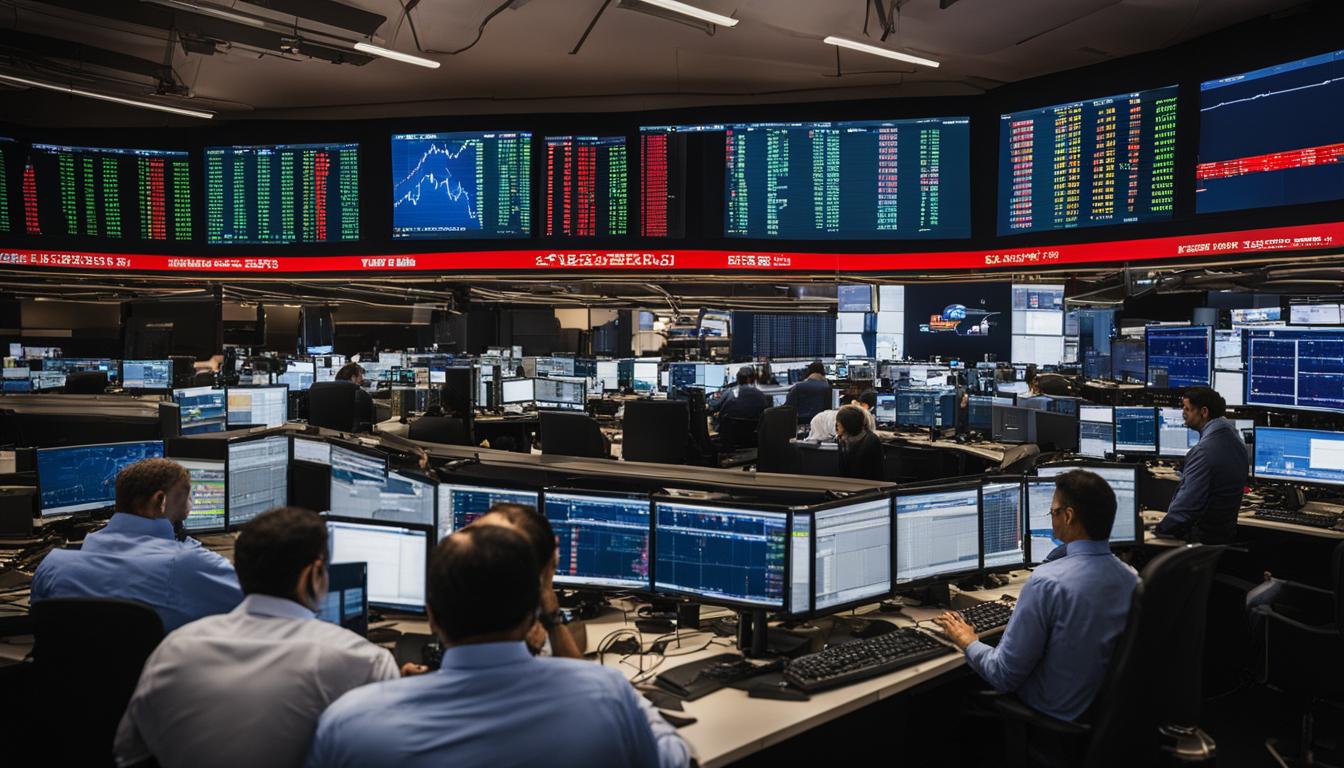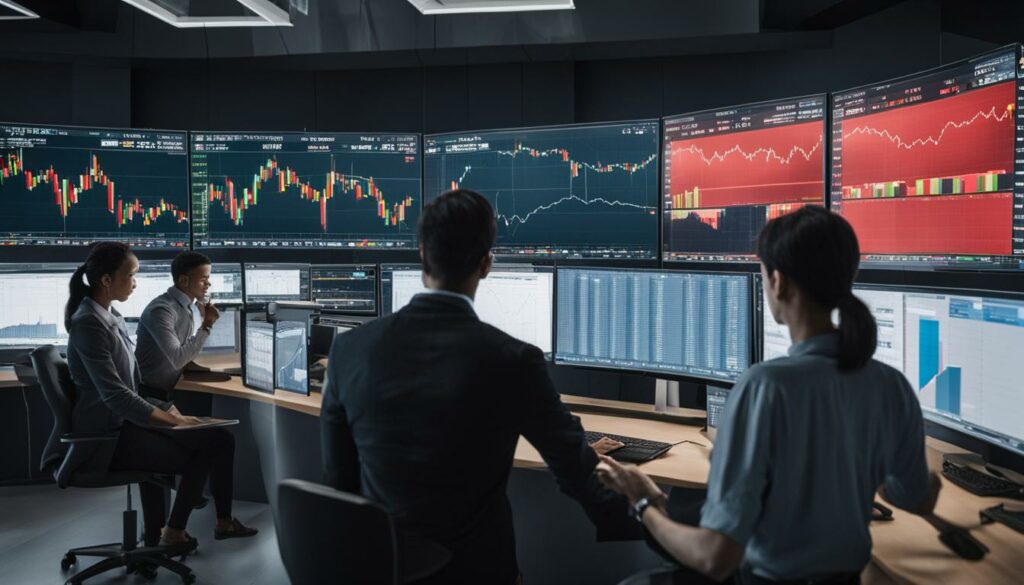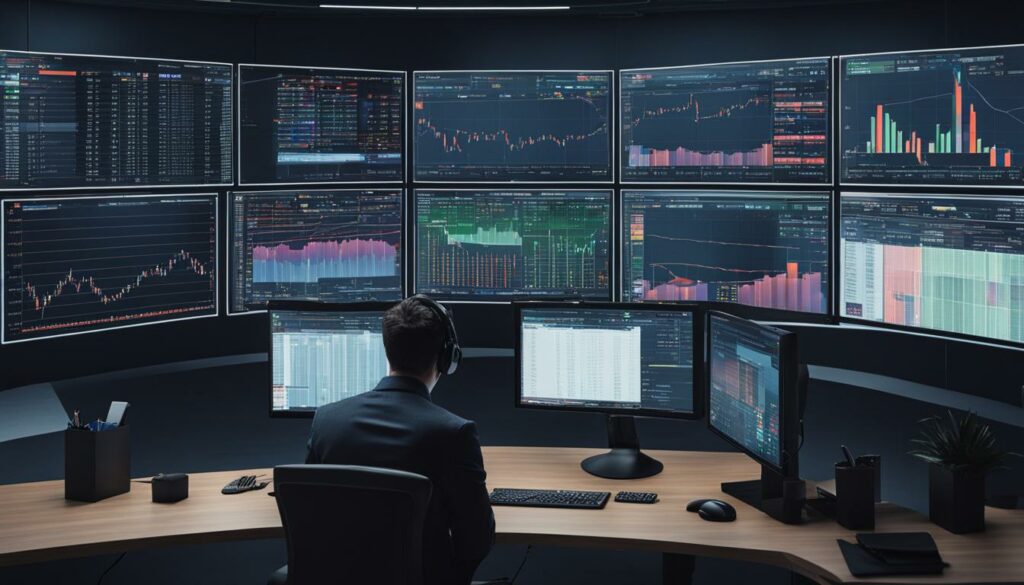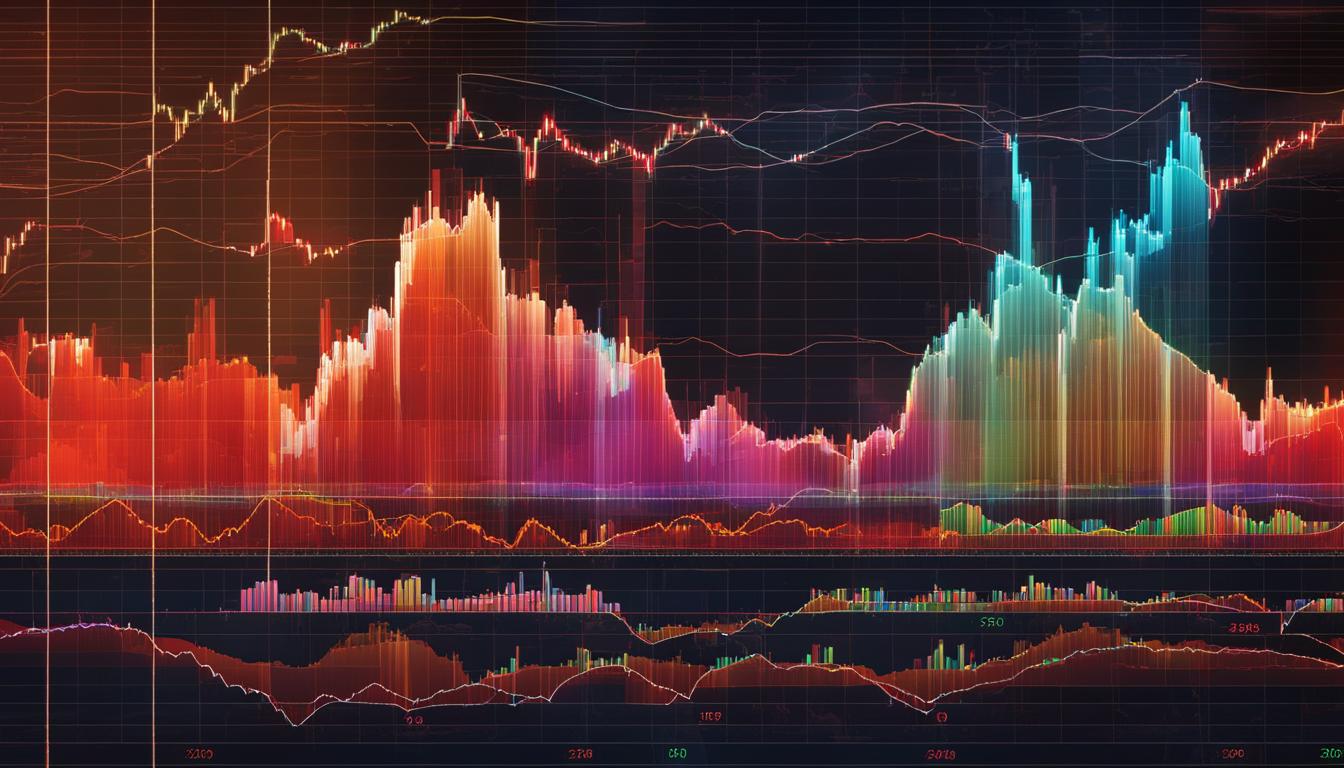FX Spot vs FX Options Trading: A Comparison

Forex trading involves spot trading and options trading. Spot trading refers to the physical exchange of currency pairs at settlement, while options trading involves the buying and selling of contracts for future currency exchange at a specific rate. Both types of trading have similarities and differences that we will explore in this article.
Key Takeaways:
- FX spot trading involves immediate physical exchange of currency pairs at settlement.
- FX options trading involves buying and selling contracts for future currency exchange at a specific rate.
- Spot trading focuses on immediate changes in the market, while options trading offers flexibility for future trading.
- Both types of trading require a solid understanding of the market and risk management strategies.
- Traders can choose the most suitable trading approach based on their financial goals.
Understanding Spot Trading
In the world of forex trading, spot trading plays a significant role. It involves the immediate physical exchange of currency pairs in the currency spot market. Traders engage in spot trading to take advantage of exchange rate volatility and capitalize on short-term price movements in the FX market.
The spot price, also known as the current exchange rate, is determined at the exact moment of the trade. It reflects the supply and demand dynamics of the market and can be influenced by various economic and geopolitical factors. Traders closely monitor the spot price to make informed trading decisions.
Exchange rate volatility is a crucial aspect of spot trading. Fluctuations in currency values can present opportunities for traders to profit or protect themselves from potential losses. However, it’s important to note that spot trading carries inherent risks due to the unpredictability of the market. Traders must carefully analyze market conditions and utilize risk management strategies to mitigate potential downsides.

The Importance of the FX Market
The FX market, also known as the foreign exchange market, is the largest financial market globally, with trillions of dollars traded daily. It operates 24 hours a day, five days a week, allowing traders from around the world to participate in spot trading and other forex activities.
The FX market is influenced by a wide range of factors, including economic indicators, geopolitical events, and central bank policies. These factors contribute to the constant fluctuations in exchange rates, providing opportunities for profit for well-informed spot traders.
In summary, spot trading is a fundamental aspect of forex trading. It involves the immediate exchange of currency pairs in the currency spot market. Traders closely monitor exchange rate volatility and market conditions to make informed decisions. However, spot trading carries inherent risks and requires diligent analysis and risk management to be successful.
Exploring Options Trading
Options trading in the forex market offers traders the opportunity to buy and sell contracts that give them the right, but not the obligation, to trade a specific amount of currency at a predetermined exchange rate on a future date. Forex options, also known as currency options, provide flexibility and strategic advantages for traders.
When engaging in options trading, traders need to consider the option premium, which is the price they pay for the options contract. The premium is influenced by factors such as the expiration date of the contract and market conditions. Traders can choose between call options, which give them the right to buy a currency pair, or put options, which give them the right to sell a currency pair.
Hedging strategies are a common use of options trading in the forex market. Traders can use options contracts to protect their positions against adverse currency movements. By buying options contracts that offset potential losses from their existing positions, traders can minimize their exposure to risk. This hedging strategy allows traders to limit potential losses while still participating in any potential gains.
The Benefits of Options Trading
Options trading provides several benefits for forex traders. Firstly, it offers flexibility in managing risks. Traders have the ability to choose their desired level of risk by selecting options contracts that align with their trading objectives. This flexibility is particularly useful in volatile market conditions where currency prices can fluctuate rapidly.
Secondly, options trading allows traders to participate in the forex market without the need for physical delivery of the currencies. This eliminates the logistical challenges and costs associated with spot trading, where traders need to physically exchange currency pairs. Instead, options trading provides traders with the opportunity to profit from currency movements without the need for physical settlement.

Summary
Options trading in the forex market is a strategic approach that offers flexibility and risk management advantages for traders. By purchasing options contracts, traders can protect their positions, participate in potential gains, and limit potential losses. This type of trading provides the flexibility to choose the desired level of risk and avoid the logistical challenges of physical currency exchange. Understanding the intricacies of options trading can enhance a trader’s ability to navigate the forex market effectively.
Spot Trading vs Options Trading: Similarities and Differences
When it comes to spot trading and options trading in the foreign exchange market, there are both similarities and differences to consider. These two trading strategies involve currency exchange, but they differ in terms of timing and the nature of the transactions.
Spot Trading: Immediate Currency Exchange
In spot trading, traders engage in the immediate physical exchange of currency pairs at the prevailing market rates. It is a straightforward and direct method of trading where settlement occurs on the spot, hence the name. Spot traders focus on taking advantage of immediate market changes and fluctuations in exchange rates. They typically take physical delivery of the currencies they trade.
Spot trading is influenced by factors such as exchange rate volatility, global economic conditions, and geopolitical events. Traders in the spot market aim to profit by buying a currency pair at a lower rate and selling it at a higher rate. The determination of the trading price is based on the prevailing market rates at the time of the trade.
Options Trading: Flexibility for Future Trading
Options trading, on the other hand, provides traders with the right, but not the obligation, to trade a specific amount of currency at a predetermined exchange rate on a future date. Options traders pay a premium for the contracts, which gives them the flexibility to choose whether or not to exercise the option.
Options trading offers traders the ability to hedge against currency risk and manage their exposure to market fluctuations. It allows for more strategic and nuanced trading decisions. Unlike spot trading, options traders do not necessarily take physical delivery of the currencies they trade. Instead, they can close out their contracts before the settlement date if they choose to do so.
The determination of the trading price in options trading involves factors such as the expiration date, strike price, and market conditions. Options traders seek to profit from changes in the value of the options themselves rather than the underlying currency pairs.
Key Differences in Traders’ Behaviors
Spot traders and options traders have different behaviors and objectives. Spot traders focus on immediate changes in the market and often take physical delivery of the currencies they trade. Options traders, on the other hand, have more flexibility in terms of timing and can choose to exercise their options or close out their contracts before settlement.
While spot traders aim to profit from the movements in exchange rates of the currency pairs they trade, options traders seek to profit from changes in the value of the options contracts themselves. Options trading also allows for the implementation of more advanced trading strategies, such as hedging, where traders can offset potential losses in one position with gains in another.
| Spot Trading | Options Trading |
|---|---|
| Immediate physical exchange of currency pairs | Right, but not obligation, to trade currency at a predetermined rate on a future date |
| Takes physical delivery of currencies | Does not necessarily take physical delivery of currencies |
| Profit from changes in exchange rates | Profit from changes in value of options contracts |
| Determined by prevailing market rates | Determined by factors such as expiration date, strike price, and market conditions |
Conclusion
In conclusion, skilled traders need to consider various factors when making financial decisions in the forex market. Understanding the differences between spot trading and options trading is crucial for effective risk management and achieving financial goals.
For traders looking for immediate currency exchange, spot trading offers a straightforward approach. However, for those seeking flexibility in future trading, options trading provides valuable opportunities. Traders should carefully analyze their risk tolerance and trading strategies to determine the most appropriate approach.
Successful trading also relies on utilizing robust trading platforms. These platforms offer advanced tools and features that assist traders in executing trades, analyzing market trends, and managing risks. Skilled traders should take advantage of these platforms to stay informed and make informed trading decisions.
Furthermore, experienced traders may also explore exotic options, which offer unique and advanced trading strategies. These options can provide additional opportunities for profit and risk management. However, it is important to note that exotic options require a deep understanding of their complexities and potential risks before incorporating them into a trading strategy.
FAQ
What is spot trading in the forex market?
Spot trading involves the immediate physical exchange of currency pairs at the current market rate.
What factors influence spot trading?
Spot trading is influenced by factors such as exchange rate volatility and the overall state of the forex market.
How are spot prices determined?
Spot prices are determined at the point of trade and are subject to fluctuations in the market.
What is options trading in the forex market?
Options trading involves buying and selling contracts that give traders the right, but not the obligation, to trade a specific amount of currency at a predetermined exchange rate on a future date.
What can options trading be used for?
Options trading can be used for hedging strategies and offers flexibility in managing risks.
How is the value of options influenced?
The value of options is influenced by factors such as the expiration date and market conditions.
How are spot trading and options trading similar?
Both types of trading involve currency pairs, and traders can profit from changes in the market.
How do spot traders and options traders differ in their behaviors?
Spot traders often take immediate physical delivery of the currencies, while options traders usually close out their contracts before settlement.
What should skilled traders consider when making financial decisions in forex trading?
Skilled traders should consider factors such as risk management strategies, trading platforms, and the use of exotic options for advanced trading strategies.







